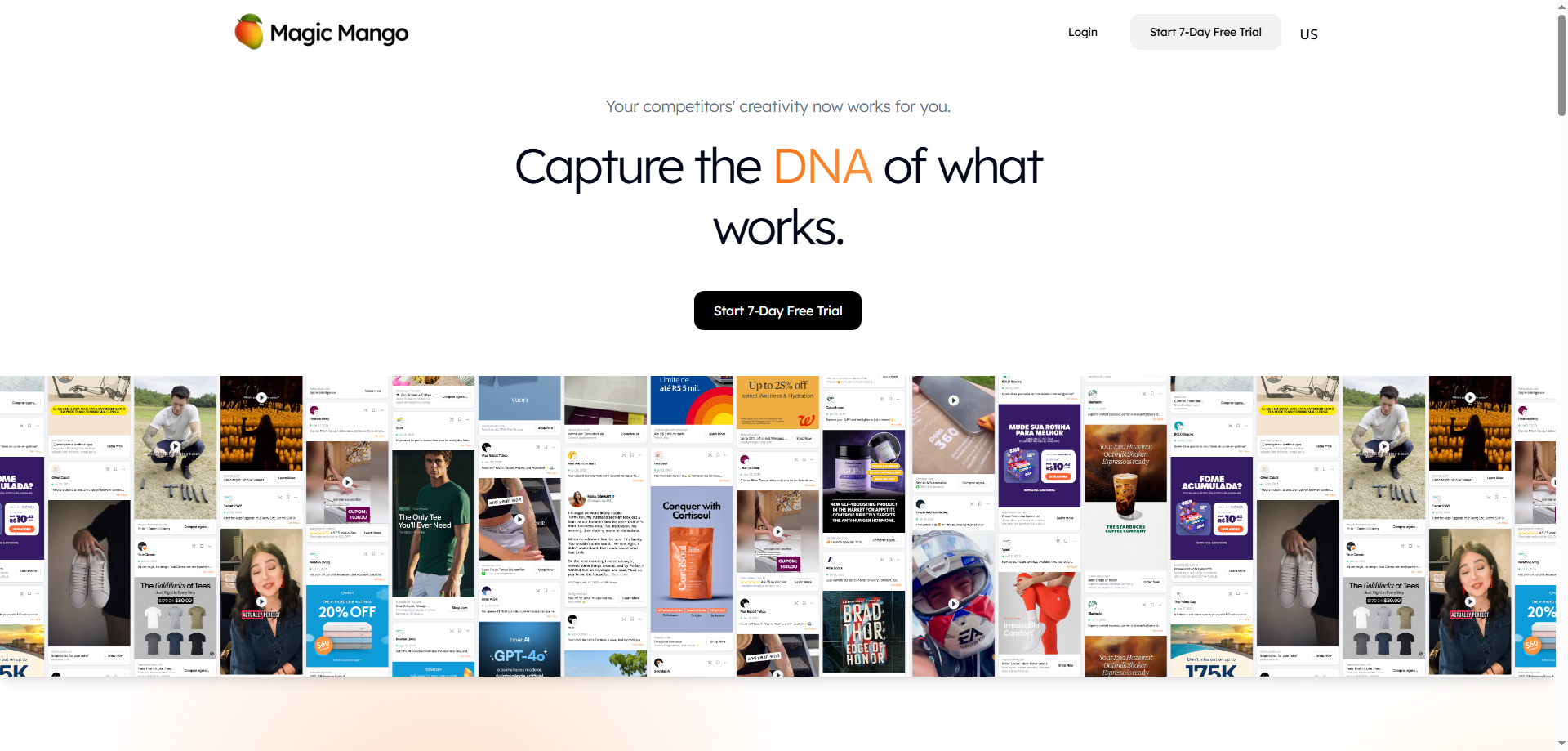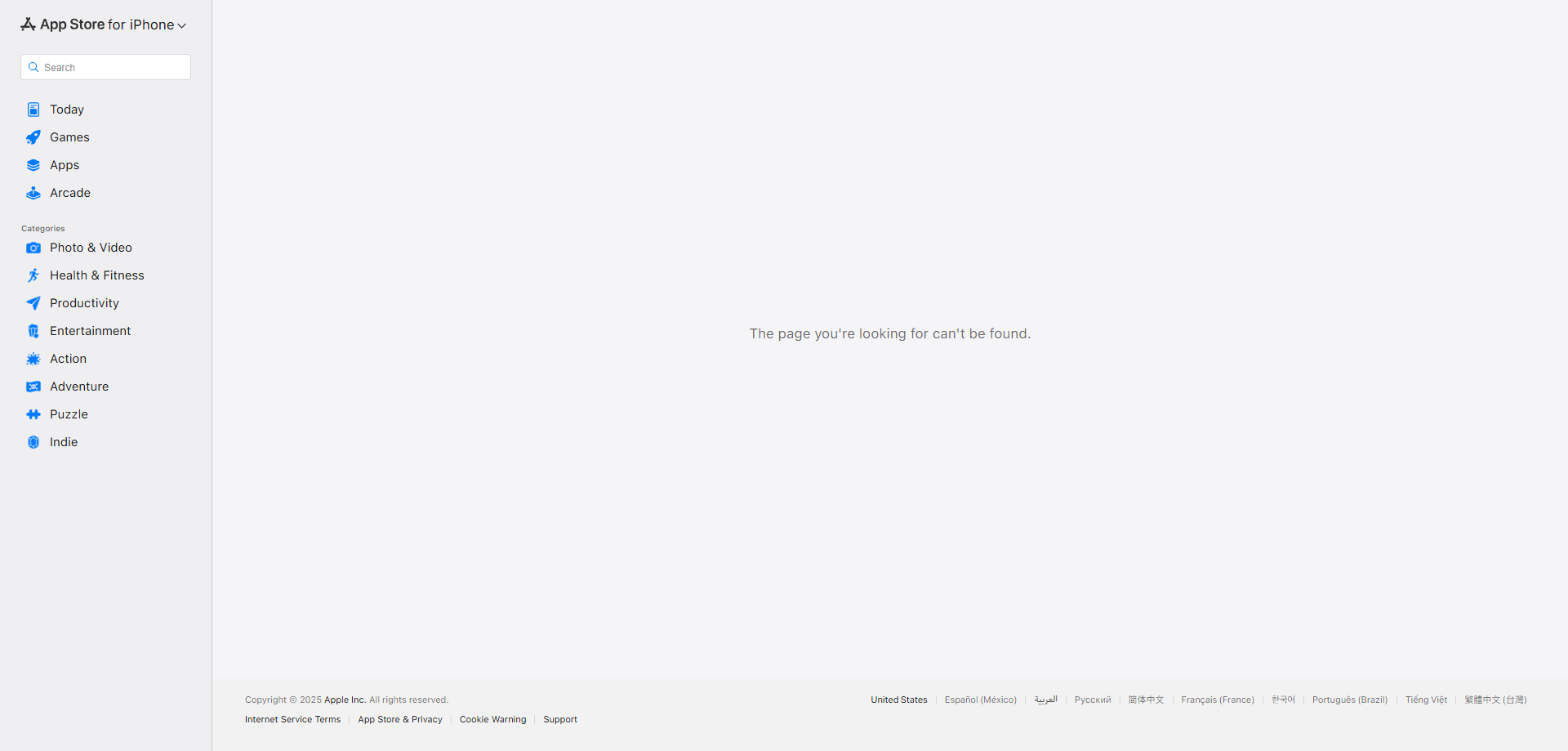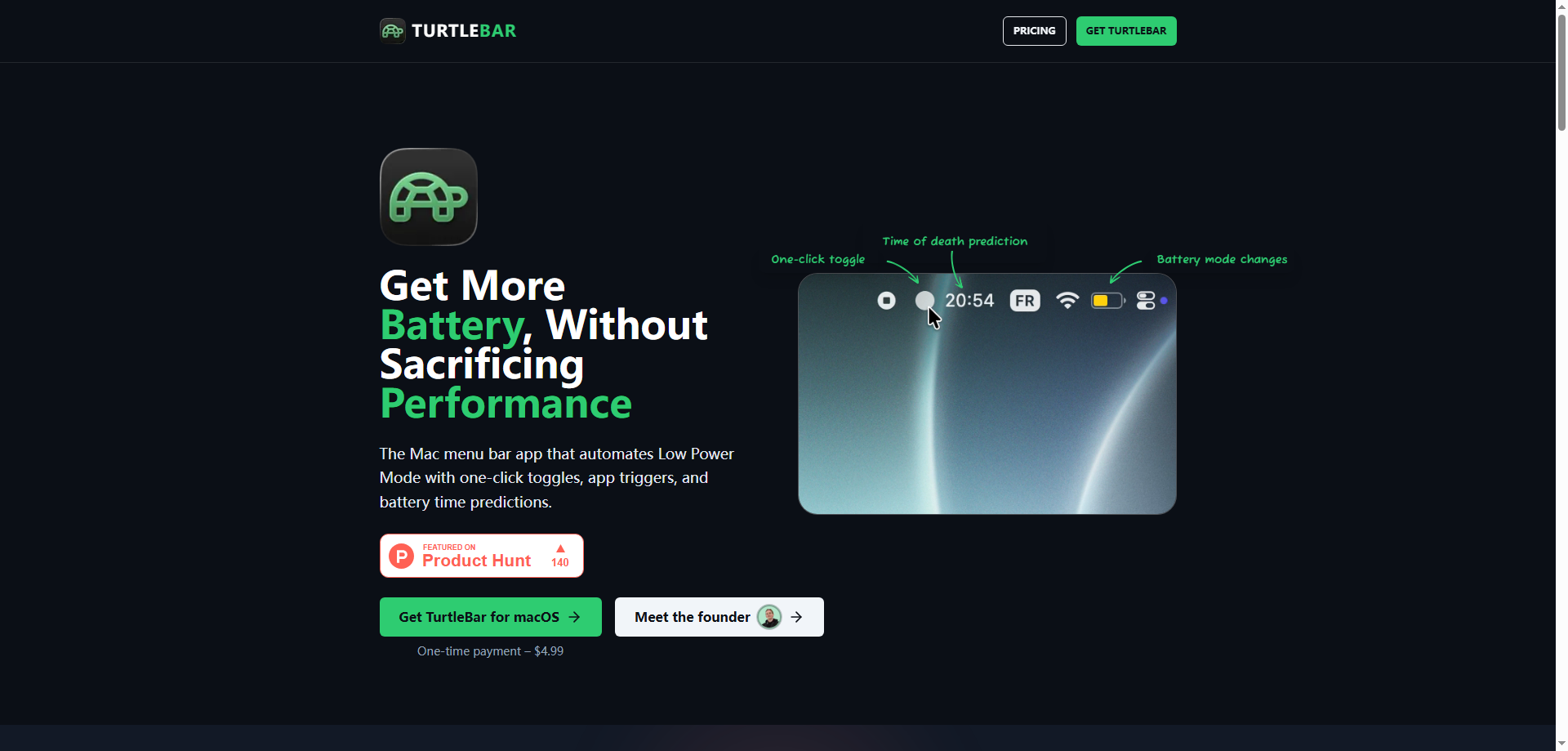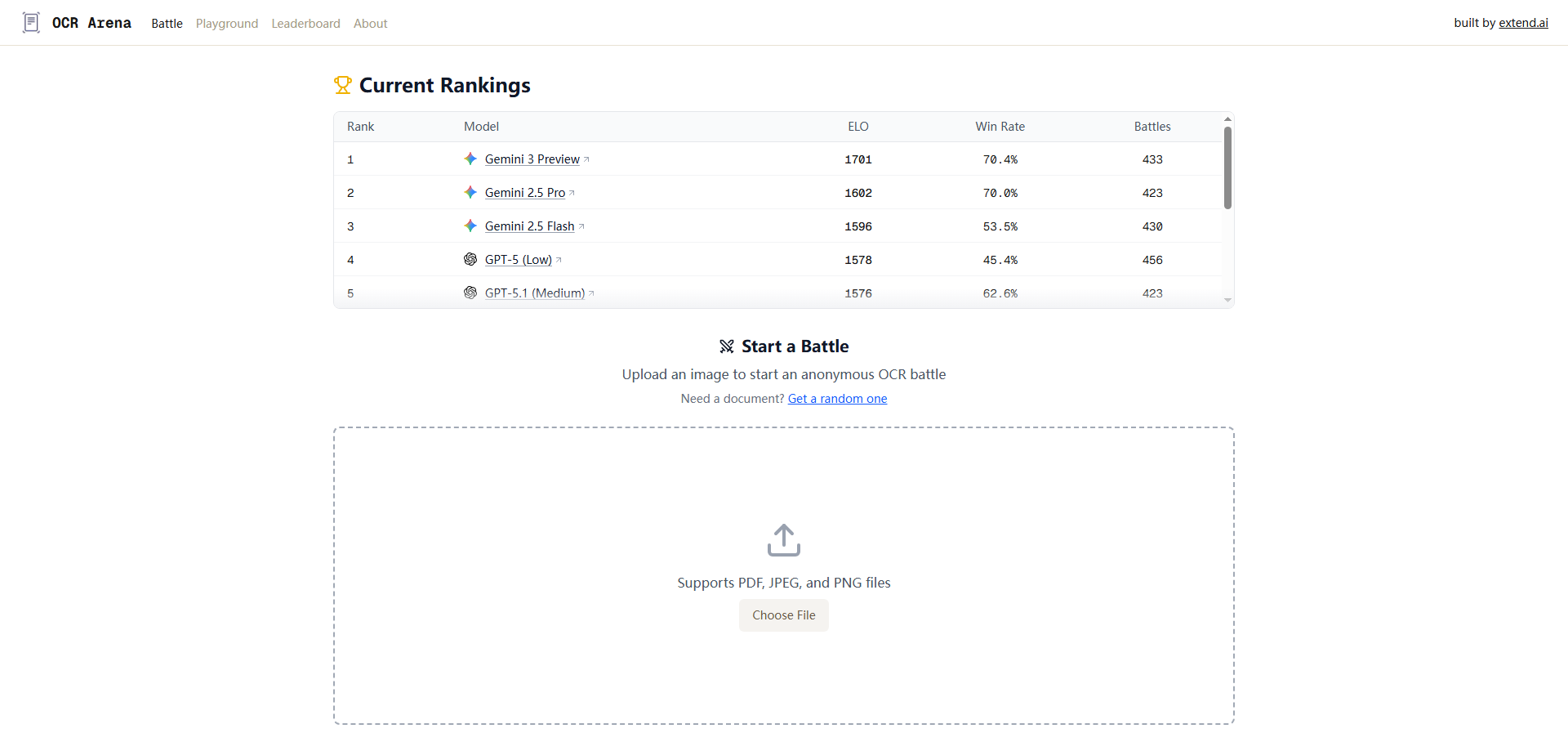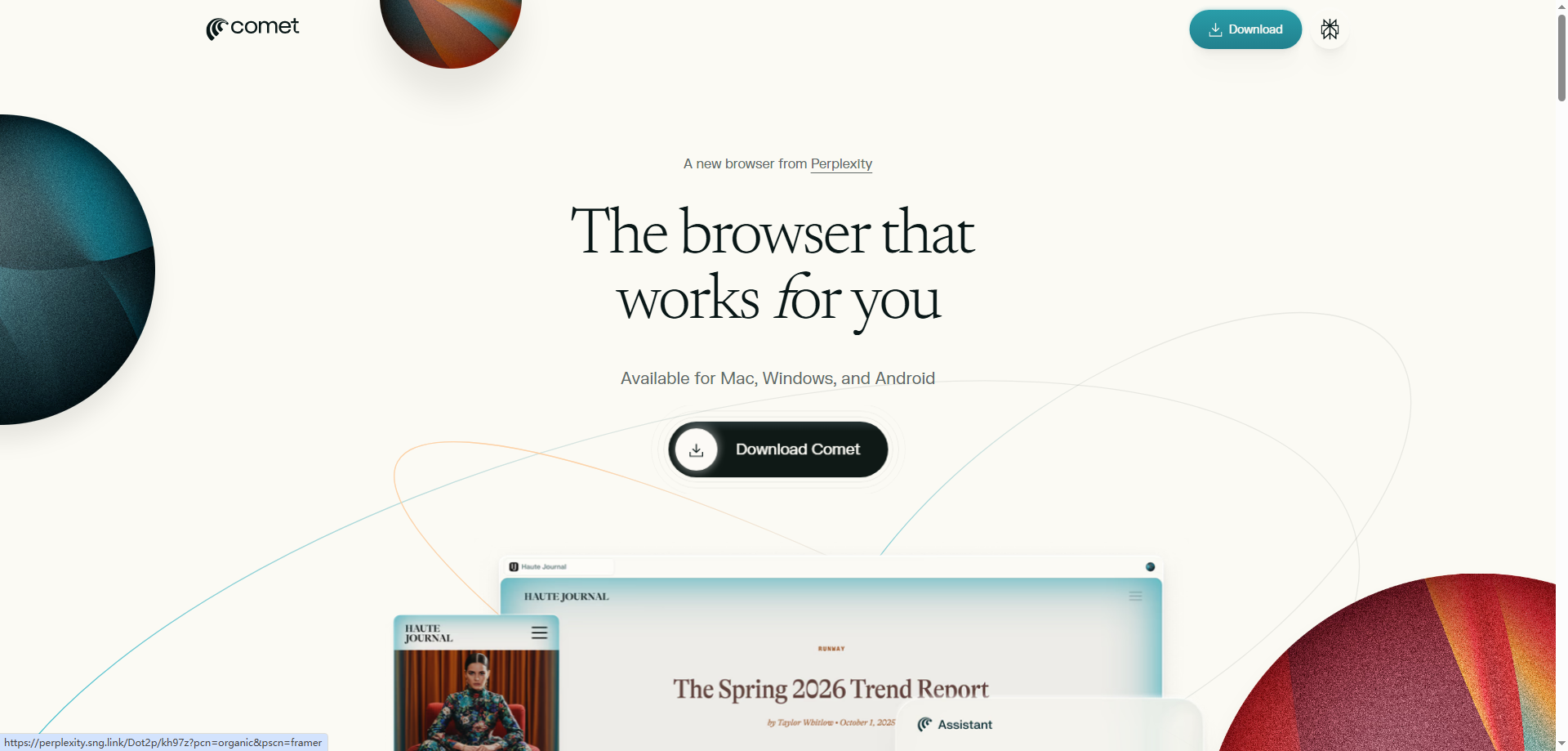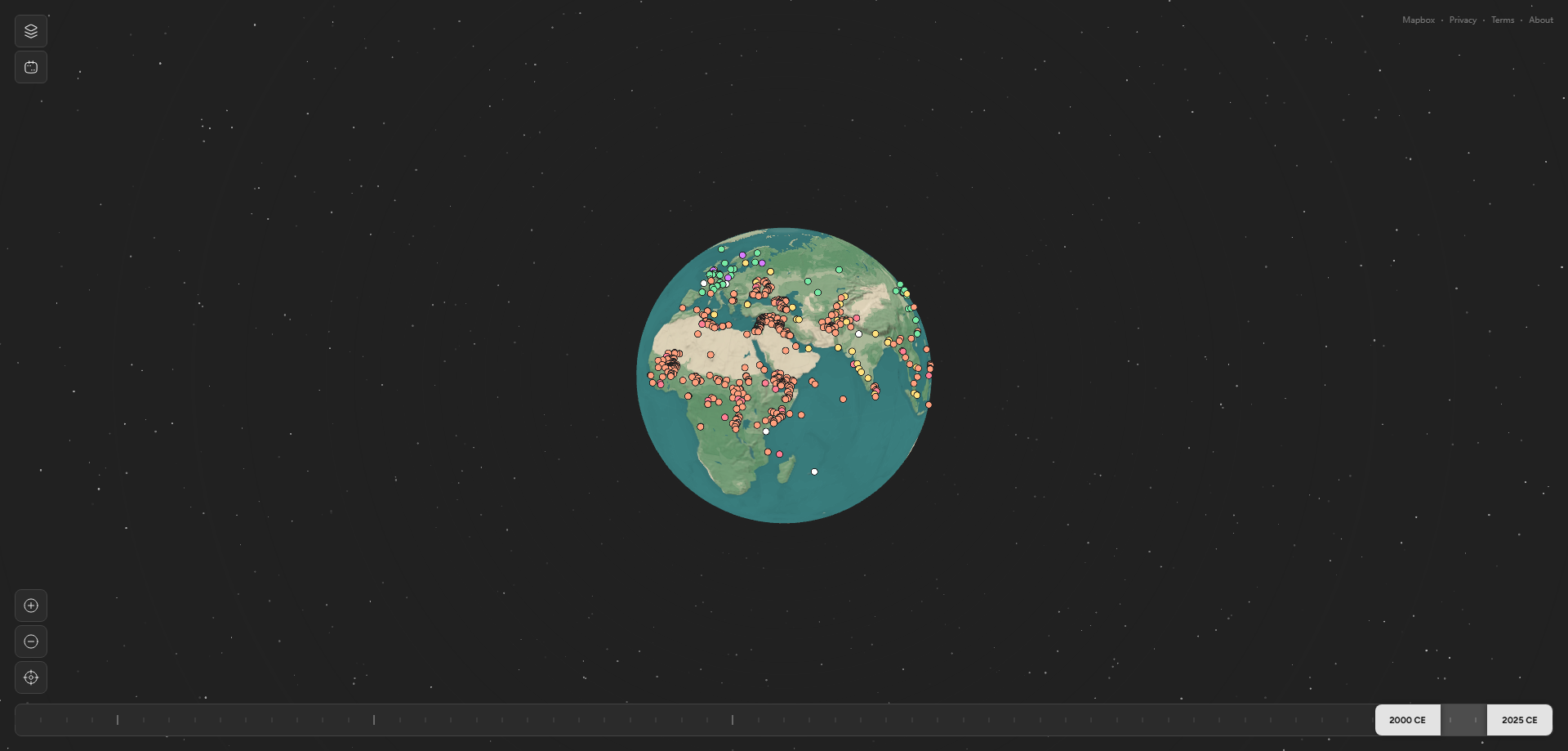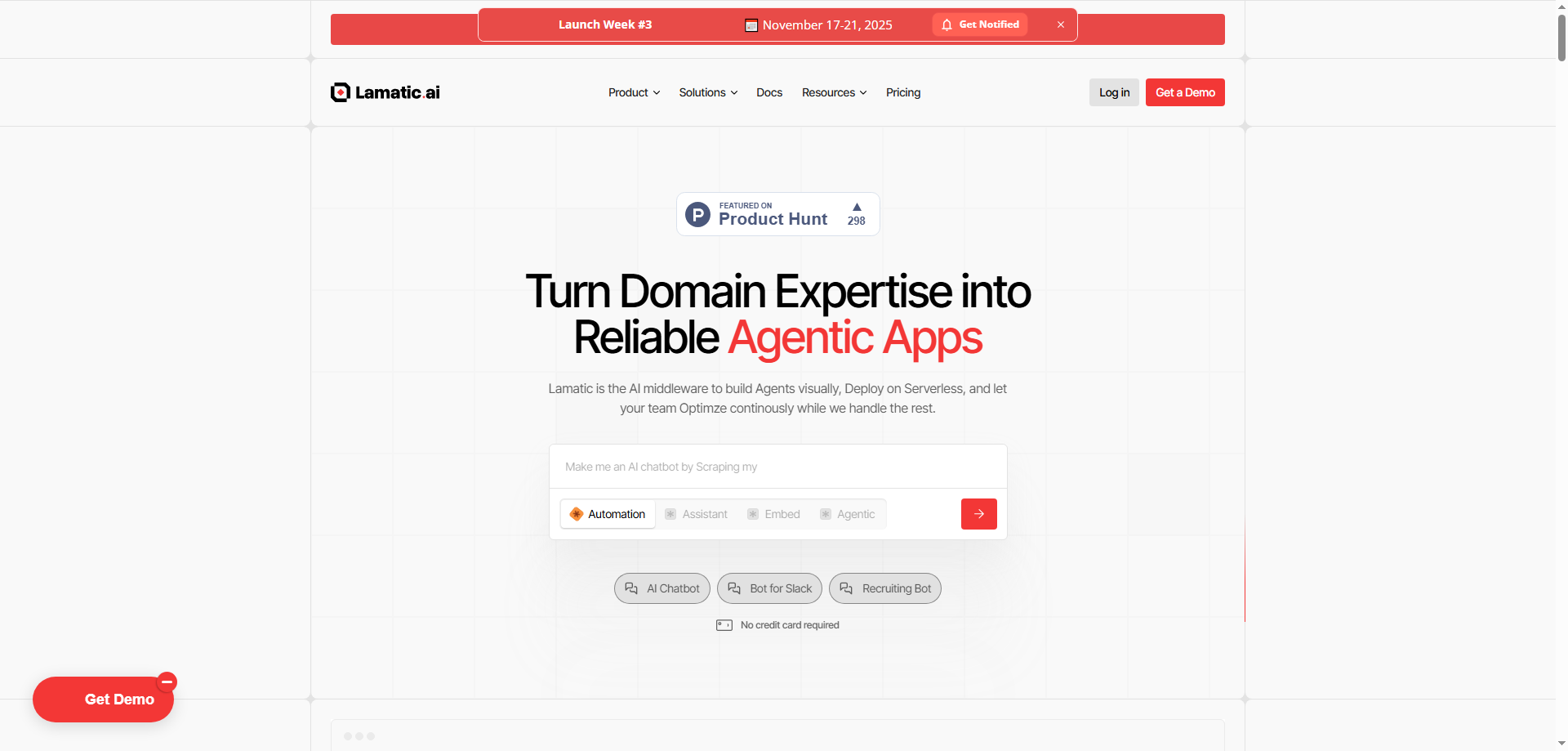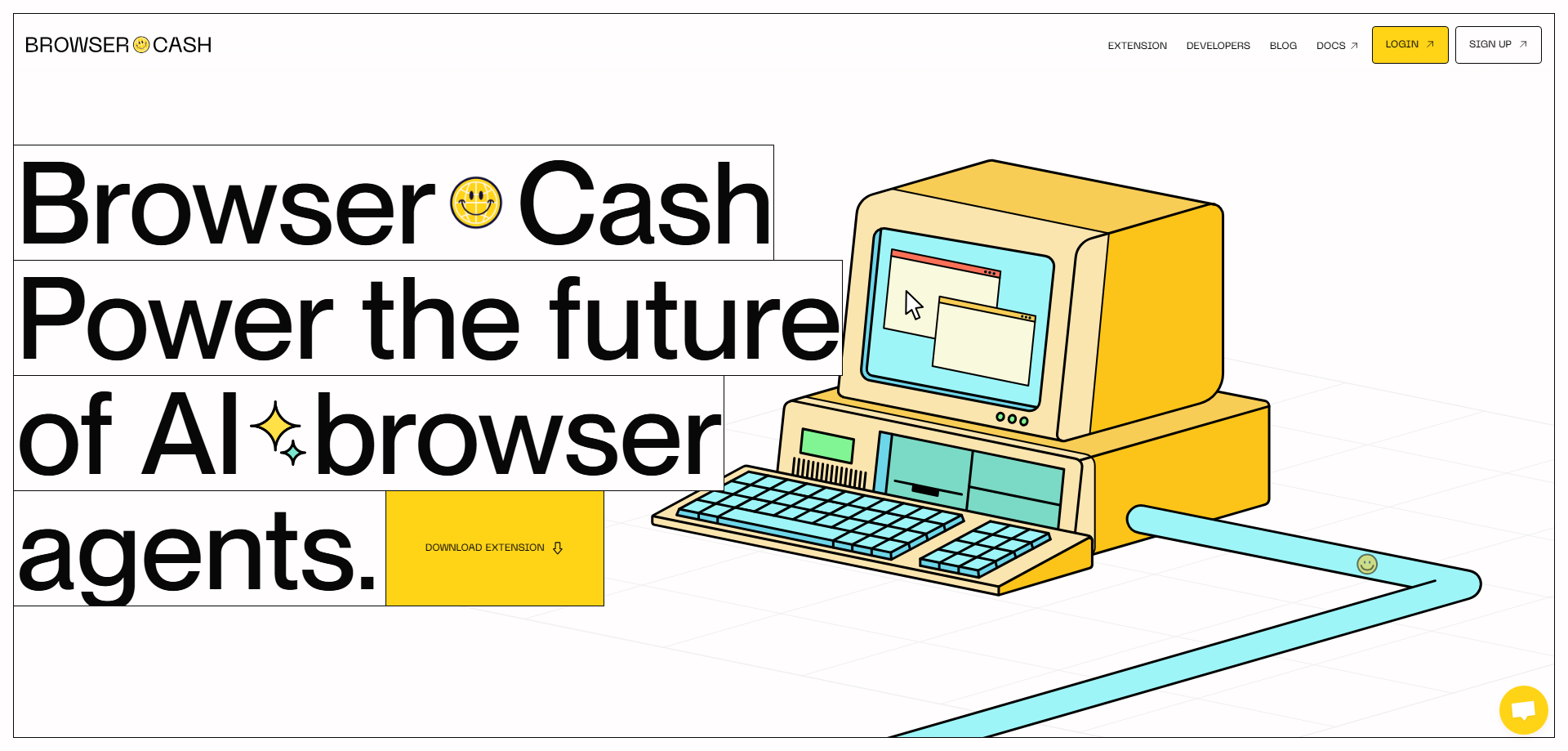The Creative Intelligence Behind Magic Mango's Approach
Let me tell you why Magic Mango caught my attention from a creative standpoint. The product isn't just another tool—it's rethinking how marketing teams approach competitive intelligence and creative inspiration. The creative insight here goes deeper than it might initially appear.
The core creative breakthrough is solving what they call the "blank page problem." Every marketer knows this frustration: you're tasked with creating a new campaign, and you're staring at a blank canvas with no idea where to start. The traditional solution involves manually scrolling through social feeds, taking random screenshots, and building messy folders of ad examples. Magic Mango creatively transforms this chaotic process into a structured, AI-powered workflow that automatically tracks brand advertising and organizes everything intelligently.
What strikes me as particularly creative is the shift from passive collection to active tracking. Instead of me hunting for ads whenever I need inspiration, Magic Mango proactively monitors brands I care about and captures their advertising activity automatically. That's creative because it flips the script—the tool works for me continuously rather than waiting for me to remember to use it.
The collaborative AI workspace concept shows sophisticated creative thinking. Magic Mango isn't just a personal research tool; it's designed as a shared team environment where multiple marketers can view, organize, and discuss ad discoveries together. That collaborative layer addresses a real workflow gap—marketing is inherently team-based, but most ad research tools are built for individual use.
I'm particularly impressed by the "reverse engineering" philosophy embedded in the product. The AI chat interface that lets me drag any ad in and instantly extract scripts, analyze hooks, and decode structure represents creative thinking about learning from advertising. Instead of just collecting pretty pictures for inspiration, Magic Mango helps me understand why ads work. That analytical depth is creatively valuable for marketers who want to actually learn from competitors rather than just copy them.
The automatic ad tracking feature shows creative problem-solving around discovery. How many great ads have I missed because they ran when I wasn't actively looking? Magic Mango solves this by continuously monitoring brand activity, ensuring I never miss important advertising developments from competitors or inspiration sources. That's creative automation that genuinely saves time and expands awareness.
What I find creatively smart is how Magic Mango bridges inspiration and analysis. Most tools focus on one or the other—either they're swipe files for creative inspiration or analytical platforms for competitive intelligence. Magic Mango creatively combines both, letting me collect visually inspiring ads while simultaneously understanding their strategic construction through AI analysis.
The shared team boards feature shows creative thinking about unifying marketing strategy. When everyone on a marketing team is looking at different ad examples and drawing different conclusions, strategies become fragmented. Magic Mango's collaborative boards create a single source of truth for advertising inspiration and competitive intelligence, which creatively solves team alignment problems.
However, I wish the creative execution pushed further in certain areas. The description doesn't mention industry-specific categorization, trend identification over time, or predictive insights about emerging advertising patterns. These would elevate Magic Mango from a collection and analysis tool to a genuinely strategic marketing intelligence platform.
The AI analysis capabilities are creatively promising but somewhat vague. What exactly can the AI extract beyond scripts and hooks? Can it identify target demographics, emotional appeals, or campaign strategies? The more sophisticated the analysis, the more creatively valuable the tool becomes for serious marketers.
The Product Hunt reception (152 votes, 16 discussions) suggests moderate creative resonance. The marketing tool community is interested but not wildly enthusiastic. That tepid response makes me wonder if the creative value proposition isn't communicated clearly enough, or if the execution doesn't fully deliver on the creative promise.
Can Magic Mango Actually Disrupt Traditional Ad Research Methods?
Here's where I need to carefully assess Magic Mango's disruption potential. The competitive landscape for ad libraries and marketing intelligence is surprisingly crowded, which creates both opportunities and challenges for meaningful disruption.
Let's talk about what Magic Mango is competing against. Right now, marketers use various fragmented approaches for ad research: Meta's Ad Library for Facebook and Instagram ads, TikTok's Creative Center, Google's Ad Transparency Center, third-party tools like AdSpy or BigSpy, screenshot folders, Pinterest boards, and manual browsing of competitor websites. Each method has significant limitations.
Meta's Ad Library and similar platform-specific tools are free but limited to single platforms and lack organization or analysis features. I can browse ads, but there's no way to save them systematically, analyze them with AI, or collaborate with my team. Magic Mango directly disrupts this by providing cross-platform tracking, intelligent organization, and AI-powered analysis in one place.
Third-party ad spy tools like AdSpy, BigSpy, or AdPlexity focus heavily on performance data—what ads are running, how long they've been active, estimated spend. Magic Mango takes a different approach, emphasizing creative analysis and collaborative inspiration rather than just performance metrics. That's a meaningful differentiation that could appeal to creative-focused marketing teams who care more about why ads work creatively than just which ads are spending the most.
The screenshot folder and Pinterest board approach—which honestly, many marketers still rely on—is obviously inferior to an organized, searchable, AI-analyzed ad library. Magic Mango completely disrupts this manual, chaotic method with automated tracking and intelligent organization. For teams currently using these primitive approaches, the upgrade potential is massive.
Swipe file tools like Swiped.co or Really Good Emails focus on curating great examples but lack automatic tracking of specific brands and AI analysis. Magic Mango's automatic monitoring and analytical capabilities make it more comprehensive than pure swipe file collections.
For competitive intelligence platforms like Crayon or Kompyte, Magic Mango offers a more affordable, creative-focused alternative. These enterprise platforms are comprehensive but expensive and complex. Magic Mango might disrupt the lower end of the market by offering "good enough" competitive ad intelligence without the enterprise price tag and complexity.
However, the disruption faces significant limitations. Platform coverage is crucial—if Magic Mango only tracks ads from certain platforms, it can't fully replace comprehensive research. The description doesn't specify which advertising platforms it monitors. Does it track Meta, TikTok, Google, LinkedIn, Twitter, YouTube, and display networks? Without broad coverage, the value is constrained.
The depth of analysis matters for disruption potential. If the AI can only extract basic scripts and identify surface-level hooks, it's useful but not transformative. Competitive tools might offer deeper performance analytics, audience targeting insights, or historical trend analysis that Magic Mango lacks.
The real-time tracking capability is potentially disruptive. If Magic Mango can alert me immediately when competitors launch new campaigns, that's genuinely valuable competitive intelligence. But if there's significant lag or limited brand coverage, the disruption potential diminishes.
The collaborative features could disrupt team workflows significantly. Most ad research tools are individual-focused. If Magic Mango genuinely enables better team collaboration around advertising intelligence, that's a meaningful differentiator for agency and in-house marketing teams.
Where I see the strongest disruption potential is for small to mid-sized marketing teams doing creative-focused competitor research. These teams currently cobble together free platform tools, screenshots, and manual analysis. Magic Mango offers a unified, AI-enhanced alternative that could significantly improve their workflow.
So my honest assessment: Magic Mango could disrupt chaotic manual ad research methods and potentially challenge lower-tier ad spy tools, but it's unlikely to fully replace comprehensive competitive intelligence platforms or free platform-native ad libraries. It's carving out a niche in creative-focused, collaborative ad intelligence—valuable, but not category-redefining disruption.
Will Marketing Teams Actually Embrace This Workflow?
This is the critical acceptance question. Marketing intelligence tools live or die based on whether teams actually integrate them into daily workflows. I'm cautiously optimistic about Magic Mango's acceptance potential, but I see significant barriers to overcome.
Let's start with why marketing teams might embrace Magic Mango. The pain point it addresses is absolutely real. I've personally wasted hours scrolling through social feeds looking for competitor ads, taking screenshots, and trying to organize them in folders or Pinterest boards. That workflow is inefficient and frustrating. Magic Mango automates this tedious process, which should resonate strongly with time-pressed marketers.
The "blank page problem" framing is psychologically smart for acceptance. Every creative marketer experiences that paralyzing moment when they need inspiration but don't know where to start. Positioning Magic Mango as the solution to this specific, relatable problem should drive trial and adoption among marketers who've experienced this frustration.
The AI analysis feature addresses a deeper need than just collection. Marketers don't just want to see ads—they want to understand why they work. The ability to drag an ad into AI chat and instantly get script extraction, hook analysis, and structural breakdown provides educational value that purely collection-based tools lack. That learning component could drive strong acceptance among marketers serious about improving their craft.
The collaborative workspace appeals to the reality of modern marketing work. Marketing is increasingly team-based, with multiple people contributing to campaign strategy. Tools that facilitate collaboration tend to see better acceptance because they serve actual team workflows rather than just individual tasks.
However, the acceptance barriers are substantial. The 152 Product Hunt votes and only 16 discussions suggest modest initial interest. For a marketing tool targeting a large addressable market, those numbers indicate the value proposition isn't resonating as strongly as it could. That's concerning for broader market acceptance.
The competitive tool landscape creates acceptance friction. Marketing teams already subscribe to numerous tools—social media management, analytics, email marketing, project management, creative tools. Adding yet another subscription requires overcoming significant "tool fatigue." Magic Mango needs to prove it's valuable enough to justify budget allocation and cognitive space.
The learning curve and setup requirements impact acceptance. Do I need to manually configure which brands to track? How long does it take for the automated tracking to populate enough ads to be useful? If there's significant setup friction before seeing value, many users will abandon during onboarding.
The pricing model (unspecified in the description) will critically determine acceptance. If Magic Mango requires expensive enterprise pricing, acceptance will be limited to larger teams with substantial budgets. If it's affordable for small teams and individual marketers, acceptance potential expands significantly. The sweet spot is probably somewhere around standard SaaS pricing that feels accessible but signals quality.
The platform coverage question affects acceptance too. If Magic Mango only tracks certain advertising platforms and I need comprehensive coverage across Meta, TikTok, Google, and more, I might need to supplement it with other tools. That reduces the "all-in-one" value proposition and could prevent full acceptance.
Integration with existing marketing workflows matters for sustained acceptance. Does Magic Mango connect with tools marketers already use—Slack for notifications, project management tools for campaign planning, creative tools for asset development? Without these integrations, it becomes an isolated tool rather than an integrated workflow component.
The AI analysis quality will make or break acceptance. If the script extraction is inaccurate, the hook analysis is generic, or the structural insights are obvious, users will quickly lose trust in the AI capabilities. The analysis needs to be genuinely insightful to justify the product's differentiation from simpler collection tools.
But here's why I'm still moderately optimistic: marketing teams desperately need better competitive intelligence and creative inspiration workflows. The current methods are genuinely inadequate. If Magic Mango executes well on its promise—reliable automatic tracking, genuinely insightful AI analysis, smooth collaboration features—there's a real opportunity for acceptance.
I predict acceptance will be strongest among mid-sized marketing teams and agencies that have outgrown manual screenshot methods but can't justify expensive enterprise competitive intelligence platforms. Individual marketers and freelancers might find value if pricing is accessible. Large enterprise teams might view it as supplementary rather than primary.
My Survival Rating and Future Outlook
Alright, here's my honest assessment. I'm giving Magic Mango 3 out of 5 stars for survival probability over the next year. This middle rating reflects genuine market need balanced against significant competitive and execution challenges.
Why I'm giving 3 stars (the balanced factors):
The market need is real and growing. Marketing teams genuinely struggle with competitive intelligence and creative inspiration. As advertising becomes more sophisticated and competitive, the need for better research tools intensifies. That fundamental demand creates a foundation for survival.
The AI differentiation provides some defensibility. While ad libraries exist, combining automatic tracking with AI-powered analysis offers unique value. If Magic Mango's AI genuinely delivers insightful analysis, that creates competitive advantage over simpler collection tools.
The collaborative focus addresses an underserved need. Most ad research tools are built for individuals, but marketing is team-based. The shared workspace approach could carve out a niche among teams frustrated with fragmented ad research workflows.
The development seems focused and achievable. Unlike products trying to do everything, Magic Mango has a clear, specific value proposition. That focus increases the likelihood of executing well within the defined scope.
Why I'm not giving higher (the significant risks):
The competitive landscape is intensely crowded. Free platform ad libraries, established ad spy tools, swipe file collections, and competitive intelligence platforms all compete for the same marketing budget and attention. Standing out requires exceptional execution and clear differentiation.
The market validation is weak. Only 152 Product Hunt votes from a community that includes many marketers suggests limited early enthusiasm. If the target audience isn't excited about the product launch, broader acceptance seems questionable.
The feature depth appears limited based on the description. Automatic tracking and AI analysis are good starting points, but are they enough to build a sustainable business? The product needs continuous feature development to maintain value as competitors copy core capabilities.
The monetization challenge is substantial. Marketing tools face constant pricing pressure. Free platform ad libraries set a "zero cost" baseline, while enterprise tools command premium prices. Finding sustainable pricing between these extremes is tricky.
Platform dependencies create risk. If Magic Mango relies on scraping or APIs from advertising platforms, those platforms could change access, increase costs, or block access entirely. That outside dependency threatens product viability.
The survival-threatening risks:
User retention could be problematic. Even if marketers try Magic Mango, will they use it regularly enough to justify continued subscription? Ad research is often sporadic—intense during campaign planning, then quiet for weeks. That irregular usage pattern makes retention challenging.
Competition from free alternatives is dangerous. Meta Ad Library is free and comprehensive for Facebook/Instagram. TikTok Creative Center is free and extensive. Convincing marketers to pay for features they can approximate with free tools requires demonstrating substantial added value.
The AI analysis quality is make-or-break. If the analysis is generic, obvious, or frequently inaccurate, the core differentiation collapses. Building truly insightful AI analysis requires continuous improvement and potentially significant investment.
Market education requirements are substantial. Many marketers don't yet think about "collaborative AI ad workspaces"—they think about swipe files and competitive research. Educating the market while simultaneously proving product value is resource-intensive.
The opportunities that could boost survival:
Enterprise expansion could provide stable revenue. While the product seems positioned for mid-market initially, developing enterprise features—advanced analytics, API access, custom integrations, team management—could unlock higher-value contracts.
Platform partnerships could accelerate growth. Imagine Magic Mango partnering with creative tools, project management platforms, or marketing automation systems for integrated workflows. Those partnerships provide distribution and credibility.
AI advancement creates ongoing differentiation. As AI models improve, Magic Mango could offer increasingly sophisticated analysis—predicting campaign success, identifying emerging trends, generating creative variations. That continuous improvement builds sustainable advantage.
Agency marketplace opportunity exists. If agencies build and share curated ad collections or analysis templates on Magic Mango, it creates network effects and community value beyond the core product.
Educational content and community could drive adoption. Creating resources around advertising analysis, hosting webinars with marketing experts, and building a community around reverse engineering successful ads could position Magic Mango as a learning platform, not just a tool.
International expansion represents growth potential. Advertising intelligence is a global need. Expanding to track ads across different markets and languages could significantly increase addressable market.
The bottom line:
I'm giving 3 stars because Magic Mango addresses a real need with reasonable execution but faces substantial competitive pressures and uncertain market validation. The product has legitimate potential but needs to prove differentiated value quickly and build sustainable retention.
For survival and growth, Magic Mango needs to:
- Demonstrate superior AI analysis that justifies paid subscription over free alternatives
- Build strong user retention through regular engagement and clear workflow integration
- Expand platform coverage to be truly comprehensive across advertising channels
- Find sustainable pricing that balances accessibility with revenue needs
- Develop deeper features that create increasing value over time
- Build community and education resources that position the platform as essential
The next year will reveal whether Magic Mango can establish itself as the go-to collaborative ad intelligence platform for marketing teams or becomes another promising tool that couldn't overcome competitive pressures and retention challenges.
Final Thoughts on Marketing Intelligence Tools
After examining Magic Mango thoroughly, I keep returning to one core insight: marketers genuinely need better tools for competitive advertising intelligence and creative inspiration, but the market is crowded with partial solutions, making breakthrough difficult.
Magic Mango's creative approach—combining automatic ad tracking, AI analysis, and collaborative workspaces—addresses real pain points in how marketing teams currently approach competitive research. The vision is sound and the problems are genuine.
What concerns me is execution risk in a competitive market. The gap between "good idea" and "sustainable product" is substantial, and Magic Mango needs to bridge that gap quickly with exceptional AI analysis, reliable tracking, and features that drive daily usage.
For marketing teams frustrated with chaotic screenshot folders and time-consuming manual ad research, Magic Mango deserves serious consideration. If the product delivers on its promise of automated tracking and genuinely insightful AI analysis, it could become a valuable workflow component.
But I'd be dishonest if I didn't acknowledge the uncertainty. Modest Product Hunt traction, intense competition from both free and paid alternatives, and questions about feature depth and retention create real doubts about long-term viability.
My advice for potential users: if Magic Mango offers a trial, absolutely test it with your actual workflow. See if the AI analysis is truly insightful, if the automatic tracking captures relevant ads, and if the collaboration features genuinely improve team alignment. The concept is promising, but real-world value determines whether it becomes essential or forgotten.
For the Magic Mango team: you've identified real problems and built a focused solution. Now the challenge is proving differentiated value that marketers can't get from free platform ad libraries or existing competitive tools. The AI needs to be genuinely better, the collaboration needs to drive real team value, and the overall experience needs to feel indispensable rather than just convenient.
The future of marketing intelligence will certainly involve AI-powered analysis and better collaboration tools. Whether Magic Mango captures that future or becomes a stepping stone while competitors execute better remains the open question that the next year will answer.
